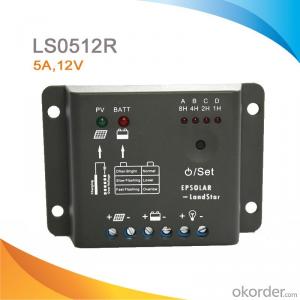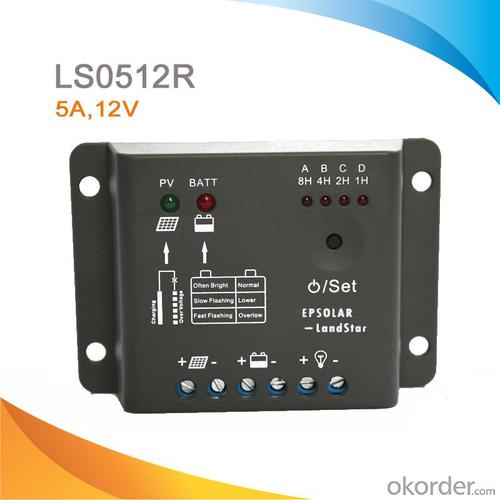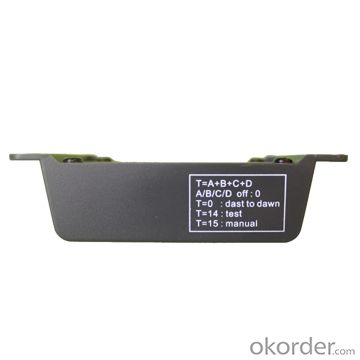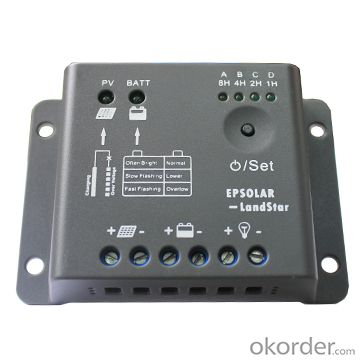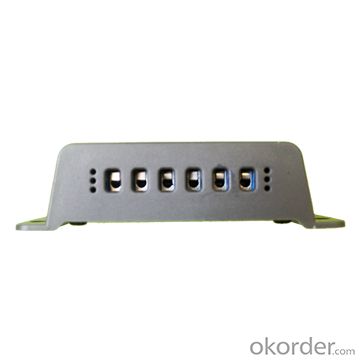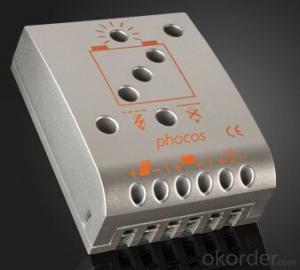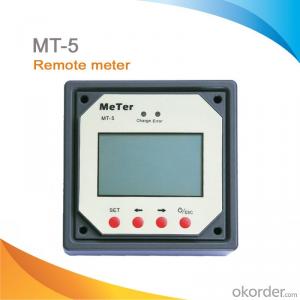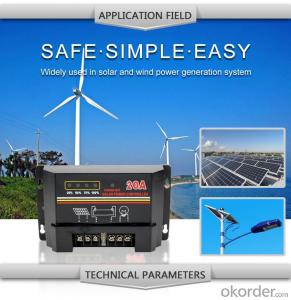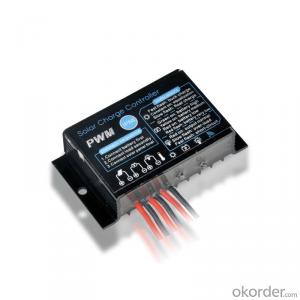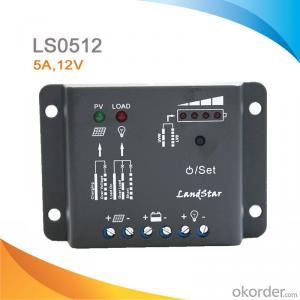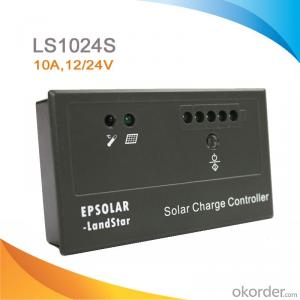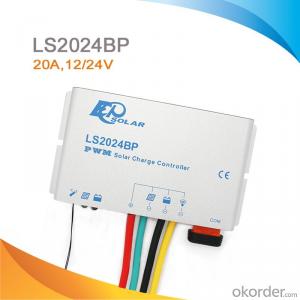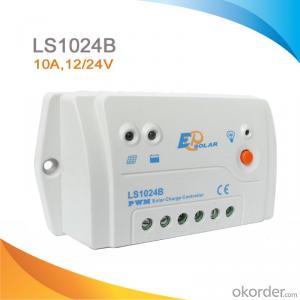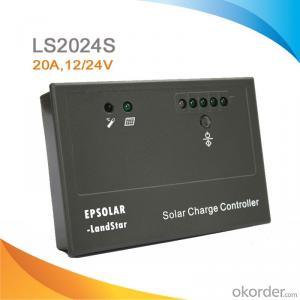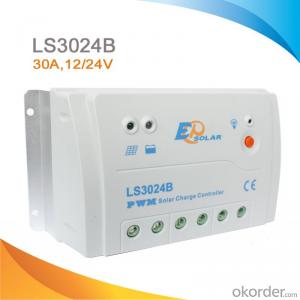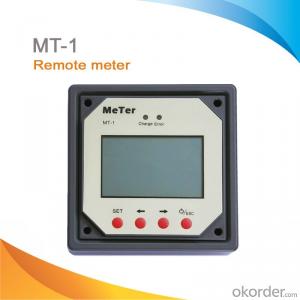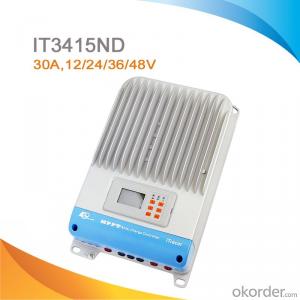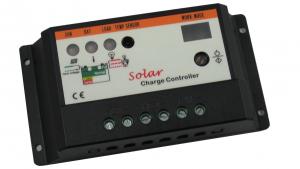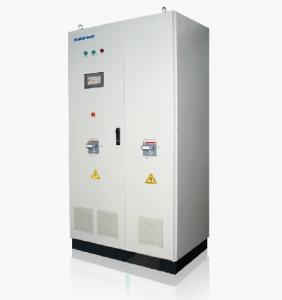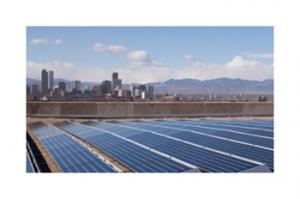Resol Solar Heating Controllers PWM Solar Lighting Regulator 5A, 12V, LS0512R
- Loading Port:
- China Main Port
- Payment Terms:
- TT or LC
- Min Order Qty:
- -
- Supply Capability:
- -
OKorder Service Pledge
OKorder Financial Service
You Might Also Like
Descriptions
Our solar controllers are designed for solar home system, ideal for rural electrification systems, and many advantages compared to other controllers: Ideal for small off-grid solar lighting system that needs light and timer control.
Features:
·High efficient Series PWM charging, increase the battery lifetime and improve the solar system performance.
·Use MOSFET as electronic switch, without any mechanical switch
·Widely used, automatically recognize day/night.
·Only one key solve all setting simply
·Intelligent timer function with 1-12 hours option
·Adopt temperature compensation, correct the charging and discharging parameters automatically and improve the battery lifetime.
Electronic Protections:
·over charging
·over discharging
·overload
·short circuit
·Reverse protection for battery
Specification:
Electrical parameters | LS0512R |
Nominal System Voltage | 12VDC |
Rated Battery Current | 5A |
Max. Battery Voltage | 16V |
Charge Circuit Voltage Drop | ≤0.26V |
Discharge Circuit Voltage Drop | ≤0.15V |
Self-consumption | ≤6mA |
Overall dimension | 97 x 66x 25mm |
Terminal | 2.5mm2 |
Net weight | 0.05kg |
Working temperature | -35℃ to +55℃ |
Humidity | 10%-90% NC |
Enclosure | IP30 |
Battery Voltage Parameters (temperature at 25℃) | |
Battery charging setting | Sealed |
Equalize Charging Voltage | 14.6V |
Boost Charging Voltage | 14.4V |
Float Charging Voltage | 13.8V |
Low Voltage Reconnect Voltage | 12.6V |
Low Voltage Disconnect Voltage | 11.1V |
Equalize Duration | 2 hours |
Boost Duration | 2 hours |
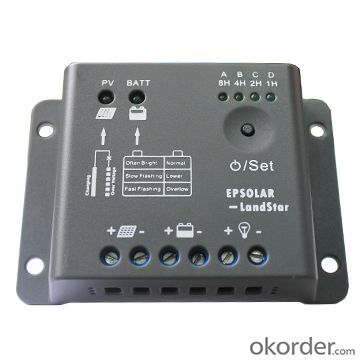
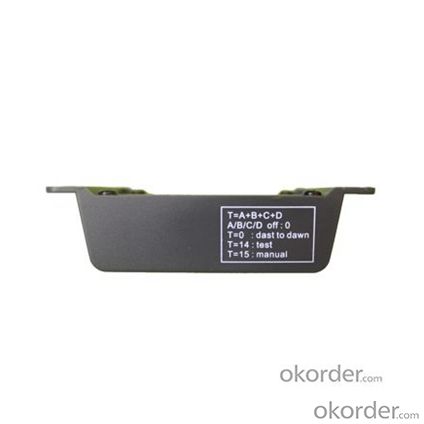
- Q: Can a solar controller be used with solar-powered weather stations?
- Yes, a solar controller can be used with solar-powered weather stations. A solar controller helps regulate and optimize the charging process of batteries connected to solar panels. Since most weather stations rely on solar power to operate, using a solar controller ensures efficient and reliable charging of the batteries, maximizing the station's performance and longevity.
- Q: How do I choose the right solar controller for my solar system?
- When it comes to choosing the perfect solar controller for your solar system, it's a decision that shouldn't be taken lightly. This decision can have a significant impact on how well your system performs and how long it lasts. To help you make the right choice, here are a few steps to keep in mind: Start by understanding the voltage and current requirements of your system. This will give you a better idea of what type of controller you need. There are generally two types of solar controllers to choose from: PWM and MPPT. PWM controllers are simpler and more affordable, making them a great option for smaller systems. On the other hand, MPPT controllers are more advanced and efficient, making them perfect for larger systems or those with shaded or irregularly shaped panels. Make sure the solar controller you choose can handle the maximum current and voltage produced by your solar panels. It's important to select a controller that matches or exceeds the specifications of your system to avoid any potential damage or inefficiencies. Consider any additional features that may be important to you. Some controllers offer temperature compensation, LCD displays, remote monitoring capabilities, and programmable settings. Think about what features would be useful for your specific needs. Take the time to read product reviews and recommendations from other customers or solar experts. This will give you valuable insights into the performance and reliability of the controller you're considering. If you're still unsure or need some expert advice, it's always a good idea to consult with a solar professional or installer. They can assess your system's requirements and provide guidance on selecting the right solar controller. Choosing the right solar controller is crucial to ensure that your solar system performs at its best and lasts for years to come. By considering factors such as voltage and current requirements, type of controller, maximum current and voltage rating, additional features, and seeking professional advice, you can make an informed decision and select the perfect solar controller for your solar system.
- Q: How does a solar controller regulate the charging and discharging of batteries?
- The solar controller, also called a charge controller or solar regulator, is a necessary component in a solar power system that manages the charging and discharging of batteries. Its main purpose is to guarantee that the batteries receive the right amount of charge from the solar panels and prevent them from being overcharged or deeply discharged, which may cause battery damage. The charging process starts when sunlight is captured by the solar panels and converted into electrical energy. Acting as an intermediary between the solar panels and the batteries, the solar controller connects them together. It monitors the voltage and current output from the solar panels and adjusts the charging process accordingly. During the charging phase, the solar controller regulates the flow of electrical energy from the solar panels to the batteries. It utilizes techniques like pulse width modulation (PWM) or maximum power point tracking (MPPT) to optimize the charging efficiency. PWM adjusts the voltage and current supplied to the batteries by rapidly switching the charging circuit on and off. On the other hand, MPPT constantly tracks the maximum power point of the solar panels to extract the maximum available power. The solar controller also integrates several protection mechanisms to prevent battery damage. It uses voltage sensors to monitor the battery voltage and ensures that it doesn't exceed the recommended charging voltage. This prevents overcharging, which could lead to battery overheating or even explosion. Additionally, the solar controller monitors the battery's state of charge and prevents deep discharging, which can reduce battery lifespan. Moreover, a solar controller often includes additional features such as temperature compensation, load control, and display functions. Temperature compensation adjusts the charging voltage based on the battery temperature to optimize charging efficiency. Load control allows the solar controller to manage the power consumption of connected devices, ensuring that the batteries are not excessively drained. Display functions provide information about the system's performance, including battery voltage, charging current, and system status. To sum up, a solar controller plays a crucial role in managing the charging and discharging of batteries in a solar power system. It ensures that the batteries receive the appropriate charge from the solar panels while safeguarding them against overcharging and deep discharging. With its various control mechanisms and additional features, the solar controller helps maximize the efficiency and lifespan of the batteries in a solar power system.
- Q: Can a solar controller be used with a solar-powered industrial facility?
- Yes, a solar controller can be used with a solar-powered industrial facility. A solar controller is an essential component that regulates and optimizes the charging and discharging of batteries in a solar system. In an industrial facility, it helps manage the flow of energy from the solar panels to power various equipment and machinery, ensuring efficient operation and maximizing the utilization of solar energy.
- Q: What is the maximum cable size that can be used between the solar panels and the batteries?
- Determining the maximum cable size for connecting solar panels and batteries involves considering several factors. These factors include the distance between the panels and batteries, the system's voltage and current requirements, and the acceptable voltage drop. To minimize power loss caused by resistance, it is generally advised to use larger cable sizes for longer distances. This is especially crucial for higher voltage systems, as the voltage drop can greatly affect the overall efficiency of the solar power system. To select the appropriate cable size, one should take into account the maximum current that will flow through the cables. Consulting a cable sizing chart or seeking advice from a qualified electrician is recommended. It is crucial to choose a cable size that can handle the maximum current without causing excessive voltage drop or overheating. Moreover, if the solar power system must adhere to specific electrical codes or regulations, such as those outlined by the National Electrical Code (NEC) in the United States, it is vital to comply with the requirements and specifications set by these authorities. Ultimately, consulting with a qualified professional or an electrical engineer is highly recommended. They can assess the specific requirements of the solar power system and provide the most accurate and suitable cable size recommendation.
- Q: Can a solar controller be used with solar battery storage systems?
- Yes, a solar controller can be used with solar battery storage systems. The solar controller regulates the charging and discharging of the batteries, ensuring optimal performance and extending their lifespan. It also helps to protect the batteries from overcharging or discharging, making it an essential component in solar battery storage systems.
- Q: How does a solar controller handle shading or partial obstruction of solar panels?
- The use of Maximum Power Point Tracking (MPPT) technology allows a solar controller to effectively manage shading or partial obstruction of solar panels. MPPT constantly adjusts the voltage and current of the panel to maintain optimal performance. When a solar panel is partially shaded or obstructed, less sunlight reaches the panel, resulting in decreased power generation. This can have a significant impact on the overall efficiency of the solar system. However, a solar controller equipped with MPPT capability can minimize these effects and ensure the highest power output. MPPT-enabled solar controllers utilize advanced algorithms and circuitry to continuously monitor the voltage and current of the panel. By actively tracking the panel's maximum power point, the controller optimizes operating conditions to maximize power output, even in the presence of shading or obstruction. When shading occurs, the MPPT controller detects changes in voltage and current and adjusts the operating point accordingly. It dynamically identifies the new maximum power point and maintains the panel's output at or close to its optimal level, compensating for the shaded areas. This allows the system to extract the maximum amount of energy from available sunlight, ensuring high efficiency and power generation. Furthermore, advanced MPPT controllers may employ partial shading algorithms that can identify specific shaded areas on the panel and allocate power generation resources accordingly. These algorithms may reconfigure the panel's connection or adjust its electrical characteristics to bypass shaded areas, further optimizing power output. In conclusion, a solar controller with MPPT capability effectively manages shading or partial obstruction of solar panels by continuously adjusting operating conditions to maximize power output. This ensures that the solar system generates the highest possible energy, even in less-than-ideal conditions.
- Q: What certifications or standards should I look for when selecting a solar controller?
- When selecting a solar controller, there are several certifications and standards that you should look for to ensure that you are choosing a reliable and high-quality product. Some of the key certifications and standards to consider are: 1. UL (Underwriters Laboratories) Certification: UL certification ensures that the solar controller meets the safety standards set by UL. It guarantees that the product has been thoroughly tested and is safe to use. 2. CE Marking: The CE marking indicates that the solar controller complies with the European Union's health, safety, and environmental protection standards. This certification ensures that the product meets the necessary requirements for distribution and use within the European Economic Area. 3. RoHS Compliance: RoHS (Restriction of Hazardous Substances) compliance ensures that the solar controller does not contain any harmful substances such as lead, mercury, or cadmium. This certification ensures that the product is environmentally friendly and safe for use. 4. ISO 9001: This certification indicates that the manufacturer follows an internationally recognized quality management system. ISO 9001 certification ensures that the solar controller has undergone rigorous quality control processes, providing assurance of its reliability and performance. 5. IEC (International Electrotechnical Commission) Standards: Look for solar controllers that comply with relevant IEC standards, such as IEC 62109-1 for safety requirements and IEC 62509 for performance testing. Compliance with these standards ensures that the solar controller meets specific technical requirements for safety and performance. 6. IP Rating: The IP (Ingress Protection) rating determines the level of protection provided by the solar controller against dust and water ingress. Look for a solar controller with a high IP rating, such as IP65 or higher, to ensure its durability and protection against harsh environmental conditions. By considering these certifications and standards when selecting a solar controller, you can be confident that you are choosing a product that meets the necessary safety, environmental, and performance requirements.
- Q: What is the maximum voltage a solar controller can handle?
- The maximum voltage a solar controller can handle depends on its design and specifications. However, typical solar controllers can handle voltages ranging from 12 volts to 48 volts, with some specialized controllers capable of handling higher voltages. It is essential to refer to the manufacturer's specifications and guidelines to ensure the solar controller can handle the specific voltage of your solar system.
- Q: How does a solar controller handle fluctuations in ambient temperature?
- A solar controller handles fluctuations in ambient temperature by utilizing temperature compensation techniques. It monitors the temperature and adjusts the charging voltage accordingly to ensure optimal battery charging. This helps maintain the battery's lifespan and improves overall system performance.
Send your message to us
Resol Solar Heating Controllers PWM Solar Lighting Regulator 5A, 12V, LS0512R
- Loading Port:
- China Main Port
- Payment Terms:
- TT or LC
- Min Order Qty:
- -
- Supply Capability:
- -
OKorder Service Pledge
OKorder Financial Service
Similar products
Hot products
Hot Searches
Related keywords
